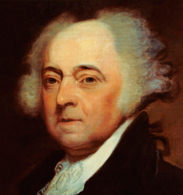John Adams rose from the vice presidency to serve as the second President of the United States. Prior to attaining the nation’s highest office, Adams was a devoted patriot and helped negotiate the Treaty of Paris, which brought an end to the revolutionary war.
Early Career
Born in Massachusetts and educated at Harvard University, Adams was a key member of the First and Second Continental Congress. He was also an outspoken critic of British control over the colonies, publishing a series of articles in opposition to the Stamp Act of 1765. In 1776, Adams helped draft the Declaration of Independence.
In 1779, Adams played a key role in negotiating the Treaty of Paris, which brought an end to the Revolutionary War. He went on to serve as an American diplomat in Europe for nearly a decade. When he returned to the United States in 1789, Adams was nominated to run for president, although it was nearly certain that George Washington would win the election.
Presidential Tenure
After receiving the second most electoral votes, John Adams was named the country’s first vice president. In 1792, he was re-elected to the same position. Unsatisfied with his role, Adams He wrote to his wife Abigail, “My country has in its wisdom contrived for me the most insignificant office that ever the invention of man contrived or his imagination conceived.”
When George Washington refused to seek a third term as president, Adams was the natural successor. He served as president from 1797 to 1801. Adams’ presidency was largely dominated by rising tensions caused by the war between France and Britain. In an effort to re-establish commercial relations with France, Adams sent three diplomats to France. The French refused to negotiate unless the United States agreed to pay a hefty bribe. When Congress public reported the conduct of the French officials (referred to only as “X, Y, and Z”), public support for war and Adams skyrocketed, although Adams never formally declared war.
Under Adams, Congress passed the Alien and Sedition Acts. The federal laws aimed to encourage foreign agents to flee the country and also silence Republican newspapers editors who were critical of the Federalist Administration.
By the turn of the century, Adams’ popularity began to wane. Thomas Jefferson narrowly defeated Adams in his bid for a second term. Prior to leaving office, Adams became the first president to live in the newly built White House. On his second night in the capital, he wrote his wife, “Before I end my letter, I pray Heaven to bestow the best of Blessings on this House and all that shall hereafter inhabit it. May none but honest and wise Men ever rule under this roof.” Adams’ son, John Quincy Adams, later served as the nation’s sixth president.








